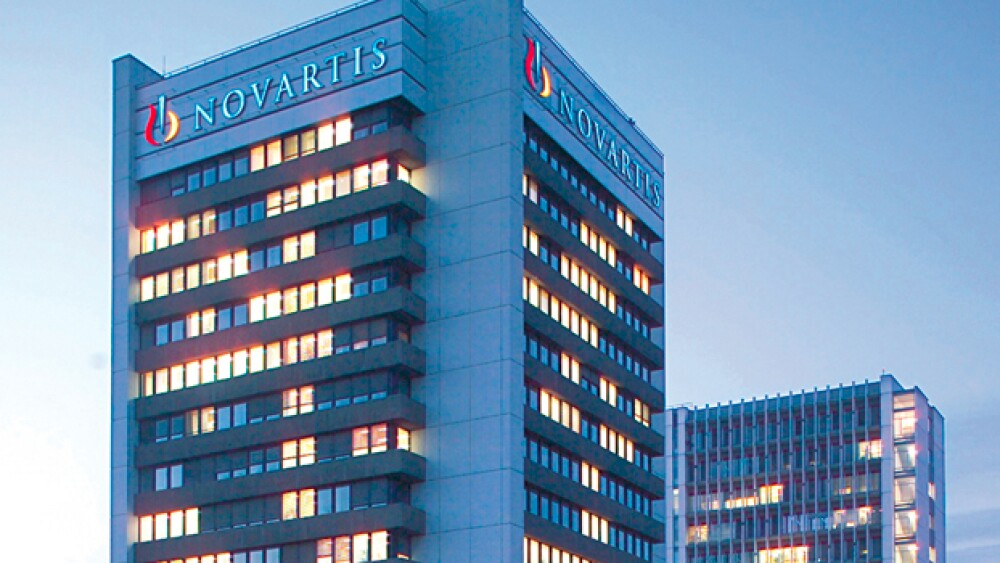Novartis is not resting on the laurels of having the first-ever-approval for a CAR-T cancer drug, Kymriah.
Novartis is not resting on the laurels of having the first-ever-approval for a CAR-T cancer drug, Kymriah. This week the Swiss-based company is showcasing four key drugs from its late stage pipeline at an R&D and investor event in England.
Novartis highlighted late-stage therapies for ophthalmology, neuroscience, immunology and cardiology. For each of these treatment areas, Novartis highlighted one key therapy. Each of these drugs could be strong revenue drivers for Novartis if they are approved by regulatory bodies.
1. Ophthalmology I
In ophthalmology, Novartis showed off data on RTH258 (brolucizumab). Presented earlier at the American Academy of Ophthalmology, RTH258 showed superiority versus Regeneron’s aflibercept (Eylea) in key secondary endpoints reflective of disease activity in patients with nAMD. Patients treated with RTH258 showed fewer signs of specific disease activity than patients treated with aflibercept, Novartis said. RTH258 patients showed less retinal fluids, less fluid in the deepest part of the retina and superior reductions in retinal thickness. Novartis said it expects to file for regulatory approval for RTH258 in AMD by the end of the fourth quarter of 2018. Additionally the company said it expects to begin clinical trials for other indications including diabetic macular edema and retinal vein occlusion.
2. Neuroscience
Novartis, along with partner Amgen, are developing AMG 334 for chronic or episodic migraine headaches. AMG 334, a selective CGRP antagonist, has shown encouraging results in reducing monthly migraine days, even in difficult to treat patients, Novartis said. CGRP is an inflammatory and pain alleviator. The company said AMG 334 is on track for a potential first-in-class launch in 2018. Migraines impact about 12 percent of the population in the United States, including children. The pain and other symptoms associated with migraines can cause sufferers to completely stop what they are doing and prevent them from working or functioning in a normal capacity for more than a day. Of migraine sufferers, about 4 million suffer from chronic daily migraines, meaning they are dealing with 15 migraines within a month.
3. Immunology
Novartis said its drug Cosentyx (secukinumab) has the potential to change the course of disease in ankylosing spondylitis (AS) and prostate significant antigen (PsA). Cosentyx, an interleukin-17 (IL-17) inhibitor, is uniquely positioned to continue growth in all indications, particularly in spondyloarthritis, where the segment opportunity is larger than psoriasis, Novartis said.
4. Cardiology
Data has shown that patients taking ACZ885 (canakinumab) saw a significant reduction in major adverse cardiac events in a subpopulation of patients who achieved hsCRP < 2mg/L three months following the initial treatment. The company said the risks were cut by 25 percent, which is stronger than initially thought. Several months ago, the company indicated the risk reduction was about 15 percent. Novartis said it is moving forward with regulatory filings in the United States and Europe for cardiovascular risk reduction.
While Novartis showed off those four treatments, the company also took the time in London to highlight its continued work with Kymriah for additional indications. Kymriah has been approved to treat patients up to 25 years of age with B-cell precursor ALL that is refractory or in second or later relapse. On Oct. 31, Novartis submitted a supplemental Biologics License Application to the Food and Drug Administration for Kymriah (tisagenlecleucel) suspension for intravenous infusion for the treatment of adult patients with relapsed or refractory (r/r) diffuse large B-cell lymphoma (DLBCL) who are ineligible for autologous stem cell transplant.
The company said continued development of its CAR-T drug, combined with the assets it acquired from French cancer company Advanced Accelerator Applications will further strengthen its oncology pipeline.





